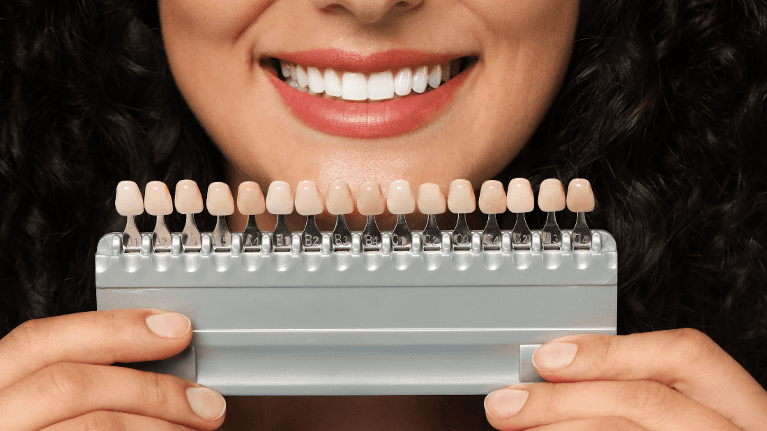
Modern techniques have enabled the creation of veneers that are more stain-resistant, thanks to improved technology and the use of high-quality materials. Due to the non-porous nature of porcelain veneers, they are generally resistant to stains. However, they are not completely stain-proof and may be susceptible to discoloration from particular foods and drinks.
While porcelain veneers are generally more stain-resistant than composite veneers, both types require proper care to maintain their brightness.
The Difference Between Porcelain and Composite Veneers
Porcelain and composite veneers differ primarily in their materials, application process, durability, and cost. Manufactured from a strong, ceramic material, porcelain veneers offer superior strength and resistance to stains. Porcelain veneers typically have a lifespan between 10 and 15 years.
Composite veneers comprise a resin structure, making them slightly less durable but more affordable than other types of veneers. These veneers can last up to seven years.
Porcelain Veneers
- Stain resistance – the non-porous material makes them resistant to absorbing stains from food and drink.
- Staining potential – despite their stain resistance, they can stain over time with prolonged exposure to some foods and beverages.
- Maintaining brightness – good oral hygiene, including regular brushing, flossing, and dental visits—prevents plaque buildup and surface stains.
- Limiting stains – reducing the consumption of staining foods and beverages can help maintain the brightness of veneers.
- Professional cleanings – regular dental cleanings can help remove surface stains, keeping your veneers looking new.
Composite Veneers
- Stain resistance – composite veneers, made from resin, are more porous and prone to staining than porcelain veneers.
- Maintenance importance – maintaining proper oral hygiene and limiting stain-causing substances is crucial for composite veneers to prevent discoloration.
- Professional polishing – if composite veneers do stain, professional polishing can help remove surface stains and restore some of their original brightness.
Porcelain veneers offer a long-lasting, natural-looking, and stain-resistant solution, while composite veneers offer a budget-friendly option.
General Tips for Maintaining Veneer Brightness
While dental veneers are generally stain-resistant, they are not entirely stain-proof. Prioritizing good oral hygiene habits, using the right products, and maintaining a balanced diet can help keep your veneers stain-free.
Brushing at least twice a day, using a soft-bristled toothbrush, removes the plaque and debris that dulls your veneers. Floss daily to remove food particles between your teeth and around the edges of your veneers to prevent bacteria from accumulating. Adding an alcohol-free mouthwash to your daily routine helps reduce bacteria while keeping your mouth fresh.
Avoid toothpastes with abrasive ingredients, as these can damage the surface of your veneers. An electric toothbrush on a low setting provides a thorough, yet safe, clean.
Reduce your intake of tea, coffee, red wine, and other dark-colored drinks, as they can stain veneers over time. When consuming these drinks, rinse your mouth out with water immediately afterwards.
Hard, crunchy foods can chip or crack veneers, while sticky foods may contribute to decay. Chew with your back teeth to minimize pressure on your veneers. Consider investing in a mouthguard when playing sports to protect your veneers from harm.
If your veneers lose their shine, we can perform professional polishing to help restore their luster.
FAQs on Veneer Brightness
Can veneers be whitened?
Veneer material does not respond to traditional whitening procedures. If you are concerned about the shade of your veneers, discuss it with us, and we can pave the way forward.
Will my veneers match the color of my natural teeth?
Modern technology enables us to perfectly match your veneers to your existing tooth shade, allowing them to blend seamlessly with your natural teeth.
Can I whiten my teeth before getting veneers?
We recommend you whiten your teeth before veneer application so we can match them to your new tooth color.
Do natural teeth stain more than veneers?
Yes. Since natural teeth are more porous than veneers and tend to absorb pigments more readily, they’re prone to staining.
Can smoking stain veneers?
Smoking can cause discoloration on the surface of your composite veneers and may even discolor the edges of porcelain veneers over time.
How often should veneers have professional cleaning?
Every six months during your routine dental visit. We conduct a polish to remove surface stains to keep your veneers bright.
How do I know if my veneers need to be replaced due to stains?
If we can’t lift the stains with professional cleaning at our practice, it’s time to have new ones fitted. Additionally, if the color mismatch becomes too noticeable, it may be time for replacement.
Long-Lasting Veneers Start Here
Veneers can transform your smile, but maintaining their brightness requires consistent care and smart lifestyle choices. While porcelain veneers are highly stain-resistant, they’re not entirely immune to discoloration. Avoiding stain-causing foods and drinks, practicing good oral hygiene, and scheduling regular cleanings can go a long way in keeping your veneers looking fresh for years to come.
If you’re considering veneers or want to ensure your current ones stay in flawless condition, expert guidance matters.
At our practice, we combine advanced cosmetic dentistry with a personalized approach to help you achieve and maintain a stunning smile. From your initial consultation to long-term care, we ensure your veneers not only enhance your appearance but also last for years.
Book a consultation with Dr. Zadeh today and take the first step toward lasting confidence.